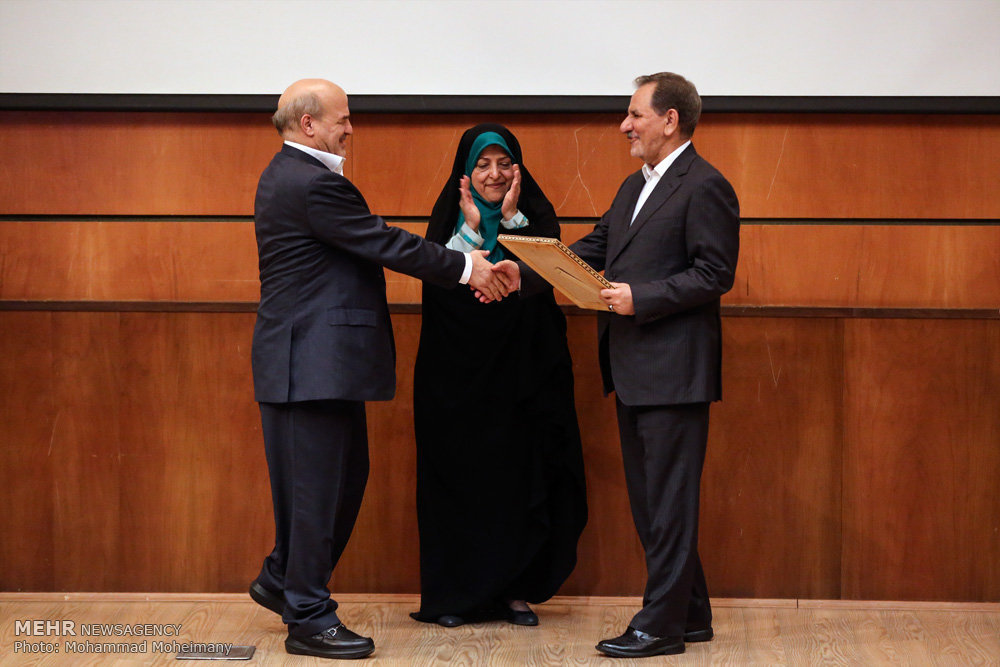New environment chief warns of ‘disastrous’ water scarcity

TEHRAN — Water scarcity is Iran’s major concern and the situation is ‘disastrous’, the newly-appointed environment chief Isa Kalantari said on Monday.
Kalantari made the remarks at his inauguration ceremony with First Vice-President Es’haq Jahangiri and former chief of the Department Environment Masoumeh Ebtekar in attendance.
Today’s environmental issues cannot be attributed to the Pahlavi era as they all have occurred after the Islamic Revolution, Kalantari noted, adding, closing schools and offices for two days may help to mitigate air pollution but water-related issues are catastrophic.
“In order to become self-sufficient in wheat we’ve lost sustainable water and soil resources through sentimental decision making,” the former agriculture minister lamented.
Kalantari went on to say that “the difficulties we are going through now are the outcomes of our decisions during 80s and 90s; we were so excited to become self-sufficient that we overlooked the long-term implications.”
Once Iran’s total livestock population amounted to 70 million which believed to exceed meadows carrying capacity, now the number has grown to 120 million, Kalantari pointed out. “Once we supported ranchers to produce up to 120,000 tons of meat which contributed to severe erosion; in fact we exchanged 120,000 tons of meat with 1 billion tons of soil per annum.”
“Currently we withdraw more than 110 percent of our renewable resources while the number should be restricted to 40 percent,” he added.
Even if the government seeks environmental reforms only some of the damages can be reversed and some are irreparable, he highlighted.
Chairman of Lake Urmia restoration committee further explained that flawed policies perused in 80s and 90s are now incurring substantial costs; “although some environmental issues such as air pollution can be resolved it’s almost impossible to reverse harms inflicted upon exhausted and depleted soil and water resources.”
“I cannot improve Iran’s environment all by myself, the government and the public should all join hand to help the environment,” he suggested.
‘We have to be able to say no’
On her valedictory speech, the former chief of the department of environment Masoumeh Ebtekar pointed out that all projects have been assessed environmentally prior to implementation and some 15 to 10 percent of the projects which did not live up to environmental standards could not acquire necessary permits.
“If we seek any improvement we have to be able to say no to some requests, if we can’t stand out against such environmentally detrimental projects there would be no environment to protect anymore,” she warned.
Partial restoration of the wetlands, namely Lake Urmia, Hamoun, and Hour-al-Azim, boosting international cooperation, empowering NGOs, and teaching environmental courses at the universities were among the accomplishments of the Department of Environment Ebtekar mentioned in her speech.
Ebtekar has been appointed as the vice president for women and family affairs in Rouhani’s new administration.
‘We are seeking sustainable development’
For his part, the first vice-president Es’haq Jahangiri, said that Iran is a developing country and cannot miss development opportunities, however, “we have stated on multiple occasions that the development which endanger Iran’s future is not what we want, we want to undergo development and safeguard our forests and environment.”
“We have to find a way to both accelerate development and protect the environment and this is what the managers should do,” he added.
Stop thinking environment is hindering development
Meanwhile, in an article published on Monday in Persian language E’temad newspaper, environmental expert Mohammad Darvish outlined some of the expectation surrounding the new administration with regard to the environmental issues.
“The Department of Environment should be authorized to veto projects that might result in environmental harms,” Darvish wrote.
The administration should put an end to numerous dam building projects and instead focus on improving water-use efficiency in agriculture sector, recycling water, reconstructing Qanats [old system of water supply from a deep well with a series of vertical access shafts] and in case none worked they can set up desalination plants as a last resort, he explained.
Teaching environmental courses at schools, promoting tourism industry, stopping groundwater resources depletion, developing bicycle lanes, establishing department of environment at all ministries, and adopting animal welfare law are of the demands environmentalist have put forward over the past years, he said.
Darvish finally expressed hope that one day everyone stop thinking that environment is hindering development.
MQ/MG
